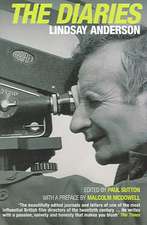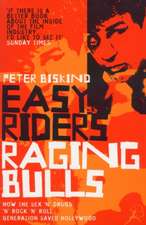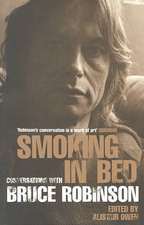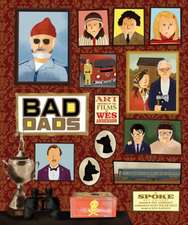Politics, Theory, and Film: Critical Encounters with Lars von Trier
Editat de Bonnie Honig, Lori J. Marsoen Limba Engleză Paperback – 17 noi 2016
| Toate formatele și edițiile | Preț | Express |
|---|---|---|
| Paperback (1) | 251.50 lei 10-16 zile | |
| Oxford University Press – 17 noi 2016 | 251.50 lei 10-16 zile | |
| Hardback (1) | 695.74 lei 31-37 zile | |
| Oxford University Press – 17 noi 2016 | 695.74 lei 31-37 zile |
Preț: 251.50 lei
Preț vechi: 306.26 lei
-18% Nou
Puncte Express: 377
Preț estimativ în valută:
48.14€ • 52.31$ • 40.46£
48.14€ • 52.31$ • 40.46£
Carte disponibilă
Livrare economică 19-25 martie
Preluare comenzi: 021 569.72.76
Specificații
ISBN-13: 9780190600174
ISBN-10: 0190600179
Pagini: 470
Dimensiuni: 178 x 254 x 25 mm
Greutate: 0.82 kg
Editura: Oxford University Press
Colecția OUP USA
Locul publicării:New York, United States
ISBN-10: 0190600179
Pagini: 470
Dimensiuni: 178 x 254 x 25 mm
Greutate: 0.82 kg
Editura: Oxford University Press
Colecția OUP USA
Locul publicării:New York, United States
Notă biografică
Bonnie Honig is Nancy Duke Lewis Professor in the Departments of Modern Culture and Media and Political Science at Brown University.Lori J. Marso is Professor of Political Science and Women's and Gender Studies at Union College.
Recenzii
Whos afraid of controversial arguments? Certainly not the authors of this collection of essays. Without ever looking for the easy way out, they face all the challenges of one of the most provocative contemporary filmmakers. In one word: in front of his films, they think.
This remarkable and surprising volume claims Lars von Trier for feminist philosophy and a reparative world practice by turning his exasperating provocations into useful invitations for serious (as well as seriously comic) political thought. Pushing beyond the reflexive, liberal-humanist outrage that too often stunts engagements with von Triers oeuvre, the authors put him in conversation with such figures as Simone de Beauvoir, Georges Bataille, Julia Kristeva, Giorgio Agamben, Davie Bowie, and Søren Kierkegaard and in the context of tragic and queer theory.
Politics, Theory, and Film: Critical Encounters with Lars von Trier finds in his brutal narratives, aesthetic clichés, and seemingly barbarous scenarios the possibility for emancipatory politics. From this volume we learn not only a great deal about von Trier; we also learn how to think about freedom more radically through his compelling example.
Lars von Trier is one of the worlds most provocative and divisive film-makers around. This book of essays faces squarely the challengeviolent misogyny or searing critique of patriarchy? Pornography and violence or exposure of the clichés of power and desire?and provides a range of brilliant and poised discussions of these extraordinary and dangerous movies.
This exciting collection is fundamentally a gamble. Instead of repudiating Lars von Triers use of cliché and provocation, the contributors double down on the most controversial, problematic, and seemingly intractable figures in his corpus: the Woman, the Sacrifice, the Earth, Evil. Wresting his films from tired evaluations and defensive posture, the essays here approach these tropes and things with due seriousness to show how their intensification in von Triers works constitutes a mode of speculative potential, one that situates the cliché at the ground of cinematic experiment, the cinematic at the heart of political thinking, andmost boldlyvon Trier at the center of feminist theory.
This remarkable and surprising volume claims Lars von Trier for feminist philosophy and a reparative world practice by turning his exasperating provocations into useful invitations for serious (as well as seriously comic) political thought. Pushing beyond the reflexive, liberal-humanist outrage that too often stunts engagements with von Triers oeuvre, the authors put him in conversation with such figures as Simone de Beauvoir, Georges Bataille, Julia Kristeva, Giorgio Agamben, Davie Bowie, and Søren Kierkegaard and in the context of tragic and queer theory.
Politics, Theory, and Film: Critical Encounters with Lars von Trier finds in his brutal narratives, aesthetic clichés, and seemingly barbarous scenarios the possibility for emancipatory politics. From this volume we learn not only a great deal about von Trier; we also learn how to think about freedom more radically through his compelling example.
Lars von Trier is one of the worlds most provocative and divisive film-makers around. This book of essays faces squarely the challengeviolent misogyny or searing critique of patriarchy? Pornography and violence or exposure of the clichés of power and desire?and provides a range of brilliant and poised discussions of these extraordinary and dangerous movies.
This exciting collection is fundamentally a gamble. Instead of repudiating Lars von Triers use of cliché and provocation, the contributors double down on the most controversial, problematic, and seemingly intractable figures in his corpus: the Woman, the Sacrifice, the Earth, Evil. Wresting his films from tired evaluations and defensive posture, the essays here approach these tropes and things with due seriousness to show how their intensification in von Triers works constitutes a mode of speculative potential, one that situates the cliché at the ground of cinematic experiment, the cinematic at the heart of political thinking, andmost boldlyvon Trier at the center of feminist theory.












